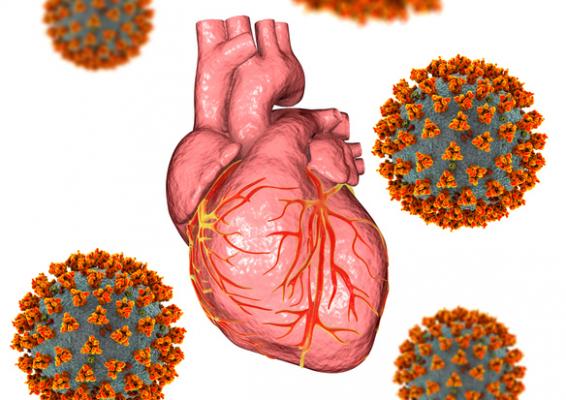
Getty Images
July 26, 2021 — Heart disease and stroke continue to kill more people in the U.S. than any other cause, despite, and likely even due to, the impact of the deadly COVID-19 pandemic last year. This is according to new provisional data released from the U.S Centers for Disease Control and Prevention (CDC). That trend is likely to continue for years to come as the long-term impact of the novel coronavirus will directly affect cardiovascular health, according to the American Heart Association (AHA).
COVID-19 has taken a huge toll worldwide and is now officially ranked as the third leading cause of death in the U.S. in today’s report. Heart disease remains at the top spot and stroke remains at #5. However, the influence of COVID-19 will directly and indirectly impact rates of cardiovascular disease prevalence and deaths for years to come, according to Donald M. Lloyd-Jones, M.D., Sc.M., FAHA, president of the American Heart Association.
“Research shows that COVID-19 can cause heart and vascular damage directly. But the indirect effects of the pandemic can affect overall cardiovascular health as well, because most heart disease and stroke deaths are preventable with appropriate medical treatment and healthy lifestyle behaviors,” explains Lloyd-Jones, an epidemiologist and chair of the department of preventive medicine at Northwestern University Feinberg School of Medicine in Chicago. “We’d made tremendous progress in those areas over the last two decades, but have seen much of that progress go out the window since COVID-19 hit.”
Unhealthy eating habits, increased consumption of alcohol, lack of physical activity and the mental toll of quarantine isolation and even fear of contracting the virus in healthcare settings, all can adversely impact a person’s cardiovascular risk, he emphasized. Lloyd-Jones stressed the following factors:
• Unhealthy lifestyle behaviors: During extended periods of quarantine, many people developed or returned to behaviors that can elevate risk for heart disease including: poor eating habits and lower quality diets, increased alcohol consumption, changes in work/sleep habits and lack of regular exercise. In addition, the mental stress of social isolation and excessive sedentary screen time could also contribute to heart disease and stroke risk.
• Missed medical visits: Many patients postponed regular doctor visits for the management of their chronic conditions such as hypertension, coronary heart disease, diabetes and high cholesterol, resulting in an epidemic of poorly controlled conditions that can increase the risk of heart attack or stroke, and could persist for years to come if not brought back under control.
• Fear of hospitals: Data from the American Heart Association show that many individuals experienced a heart attack or stroke during the pandemic and did not seek urgent care out of fear of contracting COVID-19 in a hospital setting. Unfortunately, many people may have experienced heart or brain damage with lasting consequences, or even death, that could likely have been avoided with prompt treatment.
• Heart-related risks for COVID-19 patients: Although studies of the impact of COVID-19 on pre-existing medical conditions are ongoing, the data show that individuals with cardiovascular conditions such as high blood pressure, obesity and diabetes are at increased risk for complications – including prolonged hospitalization and death – if they become ill with COVID-19. It is important for every eligible person to get the COVID-19 vaccine.
“Even as we thought the worst may be over, we’re again seeing increased numbers of people getting COVID-19 across the country in this fourth wave related to the Delta variant. We urge everyone who is eligible to be vaccinated as soon as possible, because that’s the only way to prevent or lessen the severity of this disease,” Lloyd-Jones said. “Our messages for preventing heart disease and stroke and their risk factors have never been more important. Watch your diet, get up and move more, get the sleep your body needs and please see your doctor to make sure you’re managing any chronic conditions such as high blood pressure or diabetes. We’ll need to watch and address these trends as the full ramifications are yet to come.”
For more information: heart.org/pandemic, heart.org and stroke.org
Related COVID Related Cardiology Content:
VIDEO: Antithrombotic Prophylaxis in COVID-19 Patients — Interview with Behnood Bikdeli M.D.
COVID-19 Changes Properties Blood Cells
The Long-term Cardiovascular Impact of COVID-19
Prophylaxis Against Venous Thromboembolism in ICU Patients With COVID-19 Using Enoxaparin
COVID-19 Blood Vessel Damage May Cause Brain Fog and Other Long-hauler Symptoms
Coronavirus Disease 2019 (COVID-19) and the Heart—Is Heart Failure the Next Chapter?
PHOTO GALLERY: How COVID-19 Appears on Medical Imaging
Heart Damage Found in More Than Half of COVID-19 Patients Discharged From Hospitals
COVID-19 Can Kill Heart Cells and Interfere With Contraction
Find more COVID cardiology related news and video


 November 14, 2025
November 14, 2025 









